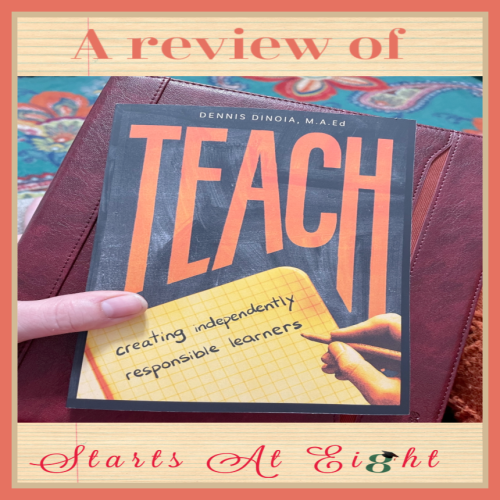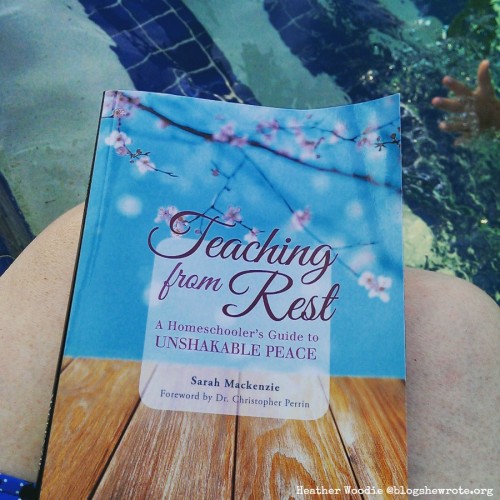It is SO easy as a new homeschooler to get overwhelmed. Even as a seasoned homeschooler overwhelm can happen. Today I’d like to share some of my tips for tackling homeschooling without feeling overwhelmed!

Tips for Tackling Homeschooling Without Feeling Overwhelmed
1. Don’t compare yourself to anyone else. Look at your children and decide what they need and then find ways to help them learn it.
2. Make a list of the skills you want to accomplish for the year, not page numbers or books.

For example:
Ben: finish learning the multiplication tables and then increase the speed. Plan: use drillsheets two times a week and keep track of his progress. Make a chart that shows which ones he needs to learn and then give him an incentive to learn it like a new Beanie Baby when he can finish a timed test in a certain time. Play math games with multiplication in them-dice games, card games, or have him make up a game. Have him make up his own flashcards with the multiplication facts on them and then quiz himself. Use the computer game Quarter Mile math to increase his speed.
Or this:
Aaron: Work on the writing process(planning, composing, revising and editing) Plan: Make a regular writing time every day for journals, letters, postcards, narration, dictation or more formal writing. Use science and history as the basis for most formal writing. Take one piece per week to actually revise and edit. Put one writing piece up on the wall that he was especially proud of. I also made up a “writing station” for him to use. It consists of a plastic tub with a lid and I put nice pencils, colored pencils, fancy paper, envelopes, stickers, and other supplies in it so that when it was time for writing, he could pull that out and everything would be all together.
So this is more or less what I have done for the boys this year. I listed what we wanted to accomplish and then worked backwards to figure out what I needed to do to get them there. I don’t necessarily use one subject or one resource to teach each item and as much as possible I try mix things together so we aren’t switching subjects all the time. Their writing is mixed in with science and history. Their history is mixed in with their literature and so on.
Last year in December, I sat down with the list of skills and put them on cards and then each day I would look at the cards and see which ones I wanted to work on for that day or for the week. As I completed a skill, I would take it out of the stack and then I could actually see the progress as we finished the year. I could pull the cards out for a review at the end of the year.
3. Try to teach your children to not be dependent on you for everything.
Your goal should be to give them the opportunity to learn to be independent learners in charge of their own learning.
You are sort of the coach and they are the players. That said, you don’t want to overwhelm them at first and you need to give them some room for success. Give them what you think is an hour’s worth of work and then let them go. At the end of the hour, take a break and do something fun. or let them go outside and run around. I know my boys come back after a break ready to work again….most of the time.
You will need to decide what you will do with the leftover work….
- Is it homework with dad? is it leftover until the next day?
- Is it something they need help doing?
- Was it too much to begin with?
- Could you give them some control over how they learn something?
- Maybe they don’t like math worksheets-could you find a different way to help them learn the same thing, perhaps a math game or a different math book?
I have found that if I decide everything for the kids, they never “buy into” it. There are so many choices that there is no reason to be stuck doing something that they hate for long periods of time. If you decide that a workbook is the approach for now, then make it work. Don’t make them do every problem on the page and negotiate different ways to get things done. Do a page orally every now and then.
My favorite thing to do is to have them tear a page out of the workbook and then go over it orally and then have them rip it up into a million pieces…they are stunned the first couple of times you have them do it. We also would play what we called the dice game. This works well with math. Roll two dice and that number is the number of problems they need to do on that page……they could get lucky and roll a two…..but then again they can roll and get a twelve. Nothing is going to permanently damage your child by easing up once a week on the workload. It makes it fun and more enjoyable for everyone.
Giving them some control changes the atmosphere in the household not only about schoolwork but about everything. It becomes more of a partnership over time but it takes a long time to establish that habit. Of course as a parent you step in when it is needed but for the big picture try to get them to work somethings independently. This can greatly reduce you chances of homeschooling without feeling overwhelmed!
4. Find the right tools is essential to homeschooling without feeling overwhelmed!

I have found over the years that certain methods and certain kinds of learning don’t fit my children. It might be my personality that shows through as a bad attitude towards certain things like textbooks and flashcards. I tend to want to make things meaningful and if I don’t think the kids are benefiting from doing something, we will skip it. I found that simple is better and less is really more. You can teach many things simply by just taking the basics and then expanding when you need to.
A little reading, a little writing and a little math everyday is on the top of the list. Science and history are on alternating days. Music practice is an everyday thing at our house and art is a must have at least two times a week. I also ask them to draw for their journals in science and history just so they have some time to use that tool in their more academic subjects.
There is great value in the non-academic subjects as a release for the children. They need that time to explore and play and to be able to get it right with no mistakes. Art and music give them the means to be creative and to have fun. Use the art and music as tools to give a balance to the left brain work that we demand of them everyday. Don’t think of art and music as “extras” that can be shoved aside to make room for more academics. Physical movement is necessary during the school day. We take a break at mid-morning and one at lunch. We will sometimes even just take “wiggle” breaks during a subject where we are getting uptight or antsy.
5. Take care of yourself.
If you need a break, take it. Doing this is a huge step in the direction of homeschooling without feeling overwhelmed! You need to listen to your inner self and take time for you.
Don’t be afraid to occasionally pop in an educational video or assign extra free reading time. If the day is going poorly, take a few hours off and bake cookies with the kids or take a long walk. Do something to break the mood and the bad feeling. No one is benefiting when you are stressed out or they are in a mood for not learning.
I have days like that and it is hard to remember but you are allowed a day off here and there. When we homeschool, we give our children so much individual time that it won’t hurt to take a day off every now and then. I tend to not take a day off but just to flip the schedule around and maybe have outside play first or art and music first and that lifts everyone’s spirits. I also try to remember that when I worked in an office all day before I started homeschooling, I had some really bad days too. It’s just a part of life. These bad days pass and you wonder what all your fussing was about.
6. Listen to your gut.
- Are you pushing yourself too hard?
- Are you pushing the kids too hard?
- Are you feeling inadequate to teach something and do you need to find some help….like a tutor or a group activity?
- Do you need your husband to step in and be the “principal” and help with bad behavior?
- Are you using the wrong curriculum? (that’s a hard one especially if you invested some money in it and you don’t want to change)
- Do you need to make up a schedule that you can stick to? Do you need more free time than you are getting?
- Do the kids need some sort of activity outside the home?
- Are you praying for God’s help enough?
- Are you allowing the children time each day to exercise?
- Do you have a good attitude towards school?
- Are your expectations clear to the kids?
There are so many things that can be nagging at you and I know for myself, I tend to want to look at the boys’ bad behavior and think that it is a reflection of me and it’s really not. I look at how they can be lazy sometimes and I get upset but that’s part of their growing and maturing. They are getting better each year and I find when I stop beating myself up over what a bad job I’m doing and really analyze things, it’s not so bad. They are learning something and they are exceeding my standards for the most part, just taking a little different road than I set out for them. I just need time to listen to my gut and know that even though none of us is perfect, we are really trying.
7. Find someone to partner with.

I can’t tell you how much this has helped me over the years. It is so nice to have someone to share with and to talk to when you are in a down mood. I have had several people that have partnered with me over the years and it’s great.
(Ecclesiastes 4:9-10) 9 Two are better than one, because they have a good reward for their hard work. 10 For if one of them should fall, the other one can raise his partner up. But how will it be with just the one who falls when there is not another to raise him up?
Isn’t that scripture great?
All Homeschoolers Feel Overwhelmed From Time To Time
I commend you for sticking with this long article. Hopefully I have helped someone out there to get over that overwhelmed feeling that all homeschoolers get from time to time by sharing my tips for tackling homeschooling without feeling overwhelmed!
~ Originally published May 2009,written by Barb-Harmony Art Mom




Leave a Reply